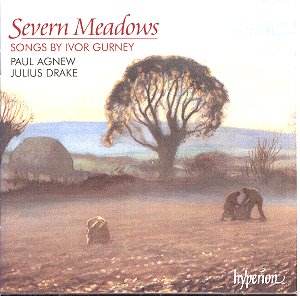 |
Ivor GURNEY (1890-1937) Crotchet
AmazonUK
AmazonUS |
Ivor Gurney undoubtedly was the finest song writer of his generation, and indeed wrote numerous settings throughout his tragically short composing life. Most songs in the present selection were written during his most prolific years, i.e. between late 1918 and early 1922, when he composed more than 200 songs. The majority of the songs in this generous cross-section of Gurney's song output date from this period. The earlier songs here, Five Elizabethan Songs of 1913/14, as well as some wartime songs such as By a Bierside (1916), Severn Meadows, In Flanders, Even Such is Time and The Folly of Being Comforted (all written in 1917) predate Gurney's final creative period which culminated in his two great cycles Ludlow and Teme (1920) and The Western Playland (1921).
The Five Elizabethan Songs are among his best songs, and quite deservedly so. They show Gurney's mastery in word setting and his ability to reflect the mood of his chosen texts in an often simple, though effective, way. His settings, however, are certainly neither simple nor straightforward. The wartime songs written in 1916 and 1917 reflect Gurney's experience of war, even though they never rise to violently dramatic outbursts. The overall mood is bitter-sweet, nostalgic or elegiac, not only in these songs but more generally in his entire song output as far as we know it. Nevertheless some of them show another facet, i.e. some mild irony and some lightly humorous touches which he often expresses in folk-like tunes such as in Ha'nacker Mill (1920), Down by the Salley Garden (1921), I Will Go with my Father A-ploughing or the delightful de la Mare setting Bread and Cherries (1921). These songs are most welcome in a collection such as this for they provide contrast and variety. As already stated Gurney's inclinations are rather towards bitter-sweet elegy or nostalgia, and his single-mindedness may prove too much to listen to in one sitting though the musical qualities are such that there is hardly a dull or indifferent song, and there is much to relish in his best songs of which the present release offers a fine selection.
Paul Agnew is an eloquent exponent of these songs. He and Julius Drake imbue their readings with variety, tonal contrasts and a sure sense of line, which is why I enjoyed this experience enormously.
Hubert Culot